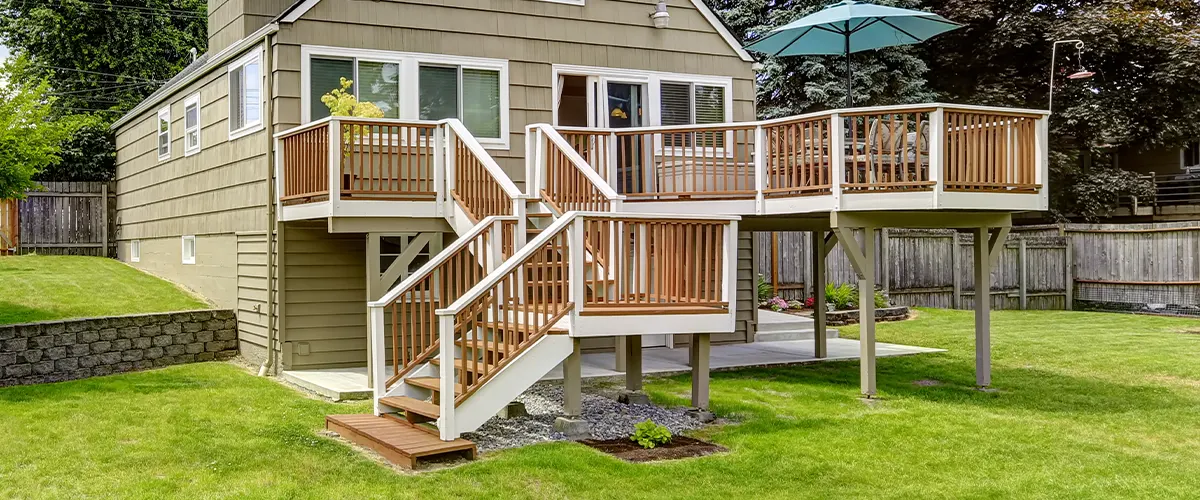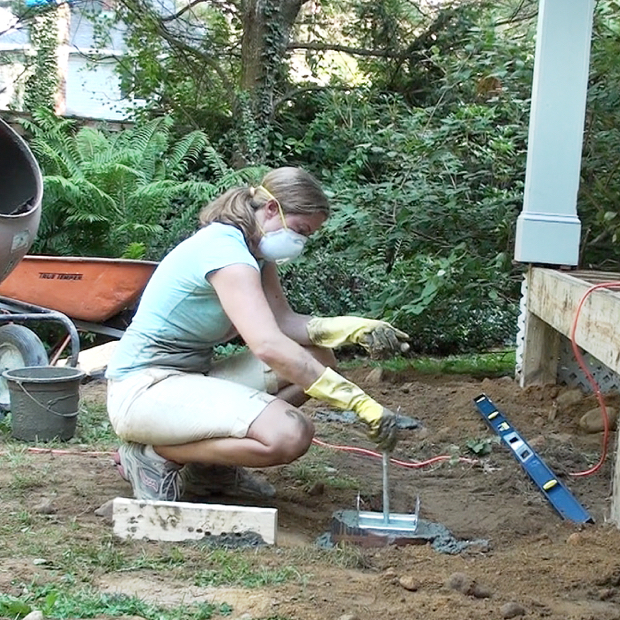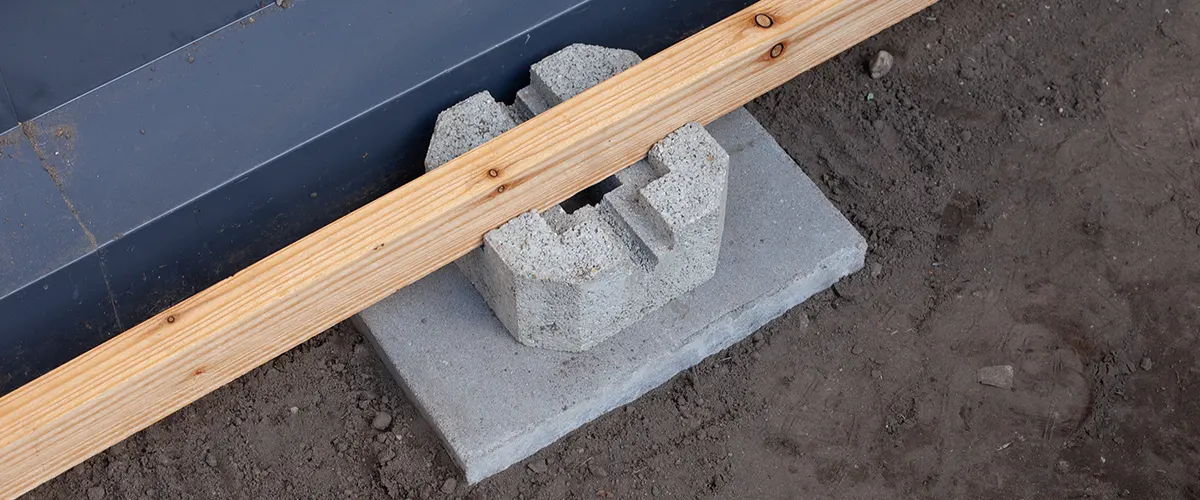Engineered for Success: The Science Behind Durable and Durable Deck Footings
Engineered for Success: The Science Behind Durable and Durable Deck Footings
Blog Article
Make Sure Stability and Longevity With Properly Installed Deck Grounds
Deck footings may not be the most attractive facet of deck building, yet they play a vital function in guaranteeing stability and durability. In this discussion, we will check out the relevance of appropriate deck footings, factors to take into consideration throughout installment, various kinds of grounds available, step-by-step setup guide, and maintenance tips for making certain long-lasting grounds.

Significance of Correct Deck Grounds
Why are effectively installed deck grounds essential for the security and long life of your deck? The answer exists in the fundamental role that deck grounds play in sustaining the weight of the whole structure. Deck footings are the foundation on which the deck relaxes, moving the tons from the deck to the ground. When grounds are not correctly mounted, it can lead to a variety of issues that compromise the stability and durability of the deck.
To start with, properly installed deck grounds disperse the weight of the deck evenly, protecting against any kind of uneven settling or sinking. This is particularly crucial in locations with unpredictable soil, as it helps to alleviate the threat of the deck shifting or breaking down. Additionally, well-installed grounds guarantee that the deck stays level, preventing any kind of architectural damages that can happen when a deck ends up being uneven.
Second of all, appropriately set up grounds supply a strong support for the deck, avoiding excessive motion and persuade. This assists to preserve the architectural stability of the deck, minimizing the threat of injuries or crashes. It also minimizes the deterioration on the deck, allowing it to withstand the components and regular use for a longer amount of time.
Aspects to Take Into Consideration for Deck Footing Setup
When setting up deck grounds, there are several essential variables to think about for correct installment. Various dirt types have different load-bearing abilities, so it is vital to conduct a soil test to ensure the footings can support the weight of the deck and its passengers. By taking right into account these elements, you can make sure the appropriate installment of deck grounds and delight in a resilient and steady deck.
Kinds of Deck Footings to Select From
There are several different kinds of deck grounds available for you to select from. Each type has its very own benefits and disadvantages, so it's important to consider your particular requirements and the conditions of your deck before choosing.
One typical sort of deck footing is the concrete footing. This involves excavating openings in the ground and putting concrete right into them to produce a strong foundation. Concrete grounds are sturdy and offer superb security, making them suitable for decks in areas with tough dirt conditions or high wind lots.
One more alternative is the helical pier footing, which contains a steel shaft with helical plates that are screwed right into the ground. These grounds fast to set up and can be made use of in different dirt types, consisting of sandy or clay soils. They are additionally adjustable, permitting simple leveling of the deck.
Sonotube grounds are another popular selection. These footings are produced by placing a cardboard tube in a hole and filling it with concrete. Sonotube footings are relatively very easy to set up and offer appropriate stability for smaller sized decks or in locations with much less requiring soil conditions.

When choosing the kind of deck ground, it's critical to consider factors such as dirt conditions, deck dimension and weight, neighborhood building codes, and personal preferences. By choosing the proper footing type, you can make sure the stability and longevity of your deck.
Step-by-Step Guide for Setting Up Deck Footings

Identify the place: Start by marking the precise placement of each footing using risks and string (Deck Footings). Take into account any local building ordinance or regulations regarding problem ranges
Dig the openings: Make use of a post hole digger or an auger to dig the holes for the grounds. The depth will certainly rely on the frost line in your area and the type of soil. Generally, a deepness of at the very least 36 inches is recommended for stability.
Degree the openings: Make sure that all-time lows of the openings are degree (Deck Footings). This can be attained by using a level or a straight board across the top of the holes
Add crushed rock: Place a layer of crushed rock at the end of each opening to boost water drainage and prevent the footing from penetrating the dirt in time.
Place the ground kinds: Place the ground forms right into the openings, ensuring they are centered and degree. Usage stakes to safeguard them in area.
Mix and pour concrete: Adhere to the guidelines on the concrete mix bag to prepare the concrete. Pour the concrete right into the ground forms, loading them entirely.
Smooth have a peek at this website the surface: Use a trowel to smooth the surface area of the concrete and get rid useful content of any air pockets. Allow the concrete to cure according to the maker's directions.
Upkeep Tips for Resilient Deck Grounds
Correct upkeep is crucial for ensuring the durability and security of deck grounds. By consistently inspecting and maintaining your deck grounds, you can protect against damages and possible safety threats. One important element of maintenance is to regularly check for any kind of signs of degeneration, such as splits or activity in the grounds. It is important to address them without delay to stay clear of more damages. if you see any problems.
Regular cleansing is also vital for maintaining deck footings. Dust, plants, and particles can collect around the grounds, which can cause moisture accumulation and decay. Cleaning the footings regularly, using a brush or a pressure washer, can help avoid these concerns and prolong the lifespan of your deck.
Along with cleansing, it is vital to keep the location around the grounds free from any kind of obstructions. Prevent stacking things versus the footings or allowing plants to expand as well near to them. These obstructions can trap dampness and trigger the footings to degrade with time.
Finally, regular resealing of the footings is suggested to protect them from wetness and various other environmental elements. Using a water resistant sealer can aid prevent water damages and prolong the life-span of the grounds.
Final Thought
To conclude, proper setup of deck grounds is essential for making certain stability and durability of your deck. Factors such as dirt type, load ability, and regional building codes need to be thought about when selecting the ideal kind of deck grounds. Following a step-by-step guide for setup and routine maintenance will assist to guarantee the footings stay sturdy and find out here durable.
In this discussion, we will check out the relevance of appropriate deck grounds, elements to think about throughout setup, different kinds of footings available, detailed installment guide, and maintenance tips for guaranteeing durable footings. Deck footings are the foundation on which the deck relaxes, moving the load from the deck to the ground.One typical kind of deck ground is the concrete footing. Insert the ground forms: Place the footing creates right into the openings, guaranteeing they are focused and degree.In conclusion, appropriate installation of deck grounds is crucial for making sure security and durability of your deck.
Report this page